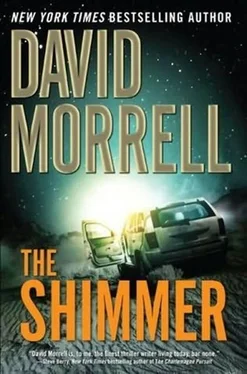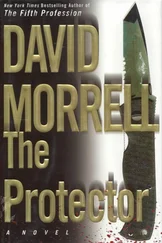“You’re listening to the music, aren’t you? But you didn’t let me know.”
“You have no idea what you’re interfering with. Unless you want to lose your job, leave us alone.”
Gordon started to close the door.
Halloway pressed a hand against it and stopped him. “That’s what you’re doing, right? You’re listening to the music.”
Gordon put more effort into closing the door.
Halloway rammed it open, knocking him back.
“Hey!” Gordon shouted.
Halloway stalked past him, approaching the table. The other researchers thought he was coming at them and stumbled away. But all he cared about was the earphones. Faintly the music drifted from them. The wonderful, soothing music.
“Gordon, you brought it back, but you didn’t tell me.”
“Of course we didn’t tell you. You’re just a damned guard.”
“I tried to be friends,” Halloway said.
“What?”
“Friendship doesn’t mean anything to you.”
“What are you talking about?”
A guard appeared in the doorway. He held an M4.
“Is everything all right?”
“Lock this man up until a helicopter comes to fly him out of here,” Gordon said. “He’s fired.”
Halloway picked up the earphones.
The guard came over. “You heard him, Earl. They want you out of here.”
Halloway raised the earphones toward his head.
The guard gripped his left forearm. “The music isn’t our business, Earl. Make this easy for everybody. Let’s go.”
Halloway put down the earphones.
The guard looked relieved. “Good. We’ll just let these people do their work.”
Halloway punched the guard in the throat.
“Uhhhh…”
The guard dropped the M4 and raised both hands to his smashed larynx.
Halloway picked up the rifle and fired a three-shot burst into Gordon’s face. The tortoiseshell glasses disintegrated.
Hearing screams behind him, he turned and saw the other scientists scrambling for cover.
Aim away from the equipment, he warned himself.
When the second guard rushed into the room, Halloway shot him in the chest.
The panicked scientists ran for the door. Relieved that their direction took them away from the equipment, he shot all of them in the back.
He picked up the second guard’s M4 and checked to make sure that its magazine was full. As he stepped into the corridor, he saw Taggard running toward him. Halloway blew his head off.
He searched the facility and shot two maintenance workers crouching behind boxes in a storage room. He found a female scientist hiding beneath a bunk and shot her, also.
Throughout, he was conscious of the terrible hum. He returned to the research area, satisfied himself that the first guard was finally dead, and put on the earphones.
His headache vanished as the music drifted and floated.
Beneath the airbase, Raleigh unlocked a metal door and stepped into a room that he hadn’t visited for three years. The smell of dankness and must hung in the air. He saw tiny red and white lights that might have been the eyes of animals, but when he flicked a switch on the wall, overhead lamps revealed that they belonged to a vast array of electronic instruments stacked on floor-to-ceiling shelves. Needles pulsed, and dials glowed. As he examined them closely, he saw that they registered an unusually high level of activity.
Perfect, he thought.
When he had personally supervised the installation of this array, the equipment had been state-of-the-art. Since then, major advances had made it necessary to supplement all the instruments with serious updates that his team had brought. Even so, the existing equipment was doing its job, amplifying energy from the source and transmit- ting it through the dish concealed in the wreckage of the hangar above him. That camouflaged dish was synchronized with the horizontal dish at the observatory.
Tomorrow night the signal would be amplified even more and beamed through a vertical dish that pointed toward a satellite.
In previous experiments, the links had failed, sometimes with disastrous results. But given the improved electronics that his team was installing, and the unusually powerful energy the source was giving off, Raleigh believed that this time he would finally be able to complete a journey that he’d begun as a boy inspired by his grandfather.
He pressed a button and activated a row of surveillance monitors. In night-vision green, they showed the ruined hangars as well as the area around the airbase. The superior lenses on the hidden cameras allowed him to magnify images impressively. He watched the dog handler and the German shepherd patrolling the fence.
He switched his attention to the viewing area down the road, where the crowd was out of control, charging toward the fence. He hadn’t counted on having human test subjects. The fact that there were hundreds of them provided an even greater benefit.
But what really mattered, he knew, were the test subjects he’d brought with him. The reaction of the men on his team would deter- mine whether or not the project could be reliably continued. They didn’t know that by setting up the experiment, they were crucial parts of it.
A shoe struck Brent’s forehead. For a moment, his vision turned gray.
“Keep the cameras rolling!” he shouted into his lapel mike as people trampled over him. He worried that the director in the station’s control room would stop the broadcast if he thought that Brent was being seriously injured on camera, so he did his best to sound in control.
From Brent’s perspective on the gravel, everything was a blur of pant legs and dresses. The truth was, he felt smothered. Another shoe struck him, this time on the side of his neck. He wheezed and rolled, trying to get away from the mob. The gravel tore at him. His shoulder banged against the underside of the motor home. Desperate, he squirmed beneath the vehicle as far as he could manage. From this vantage point, he saw shoes, boots, and pant legs rushing past. The side of his neck throbbed.
Any closer to my throat and I might have been killed, he thought. Suddenly the crowd was gone, and he crawled from under the truck.
“I’m okay! I’m okay!” he shouted into the microphone.
God, I hope the helicopter’s getting a shot of this, he thought. The left sleeve of his suit coat was torn open. Blood trickled from his forehead.
Hearing shouts and screams from the crowd, he was about to climb to the top of the motor home and continue broadcasting, but abruptly he saw Anita and Luther Hamilton lying on the gravel. The camera was on its side, its red light still on.
He ran to Anita and heard her groan. “Are you okay? Can you stand?” he asked urgently. “I need to get you away from this crowd!”
He put one of her arms around his neck and raised her. She wavered.
“Come on, I’ll take you where it’s safe.”
The producer and his crew scrambled from the truck. Brent gave Anita to them and hurried over to Luther Hamilton, who coughed and struggled to crawl. Brent helped him stand and guided him to- ward the back of the truck.
“We need an ambulance!”
“That’s for sure.” The producer pointed.
Brent turned and gaped at a half-dozen people lying on the gravel.
At the back of the parking lot, people charged against each other, pushing toward the darkness beyond the fence.
“I see them!”
“They’re beautiful!”
“Out of my way!”
“Can’t breathe!”
Brent picked up Anita’s camera and gave it to the producer. “Do you remember how to use one of these?”
“You bet. I even keep paying my union dues.”
“Then follow me to the top of the Winnebago.”
Читать дальше












